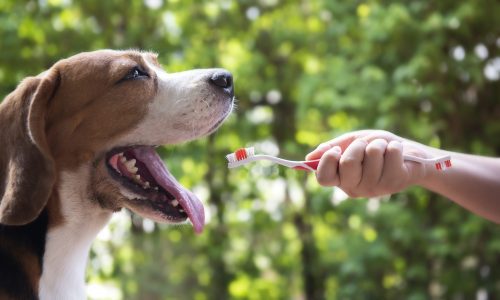By: Dr. Veja Tillman, DVM
Does your pet’s breath keep you from snuggling up? Chances are that bad breath from your furry friend could be the first signs of dental disease. Do not ignore this important part of your pet’s overall health and wellness.
WHAT IS DENTAL DISEASE?
Dental disease is a painful infection of the teeth, gums and surrounding structures. This condition occurs when bacteria, plaque, and tartar build up on the teeth and get trapped beneath the gumline. It is the most common major health problem affecting dogs and cats. According to the American Dental Society, more than 80% of dogs and 70% of cats show signs of oral disease by the time they are 3 years old.
WHY SHOULD I CARE ABOUT MY PET’S TEETH?
Dental disease carries many risk factors for your pet’s overall health. Bacteria can be absorbed into the bloodstream through the diseased tissue of the mouth and cause damage and disfunction of other major organs throughout the body. The lungs, heart, liver and the immune system, just to name a few, can all be seriously affected by dental disease. Most importantly, dental disease can decrease your pet’s quality of life.
WHAT ARE THE SIGNS OF DENTAL DISEASE?
- Swollen, puffy or red gums
- Bad breath
- Loose teeth or teeth falling out
- Mouth or face pain
- Bleeding from the mouth
- Lethargy; Depression
- Poor grooming
- Excessive drooling
- Decreased or loss of appetite and weight
- loss
- Dropping food from mouth while eating
- Swelling of the face
- Discharge from the nose or eyes
- Pawing at the face
MANAGEMENT AND PREVENTION
Early detection of dental disease is vital. To detect dental disease before it negatively affects your pet’s quality of life, regular dental evaluations at least every 6 to 12 months. This should be performed as part of your pet’s regular preventive care exams. During this routine examination, your veterinarian will identify any problems or concerning areas in the mouth and of the teeth and recommend treatment.
Homecare is also an essential part of taking care of your pet’s oral health. Brushing your cat or dog’s teeth every day (or as often as you can) will promote good oral health and prevent potentially expensive surgeries down the road.
FEBRUARY IS NATIONAL PET DENTAL MONTH!
Contact your veterinarian today to schedule a Complete Oral Health Assessment, Dental Cleaning and to discuss tooth brushing and dental products and diets.
ABOUT DR. VEJA TILLMAN, DVM
Dr. Tillman is a 2002 graduate of Tuskegee University School of Veterinary Medicine. Her veterinary practice and work experience focuses on health and wellness of pets. She is the owner of Just 4 Pets Wellness Center and can be reached at 239-270-5721.








